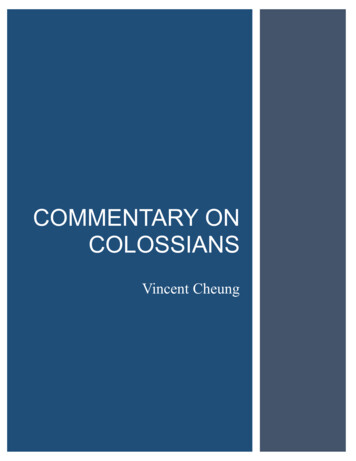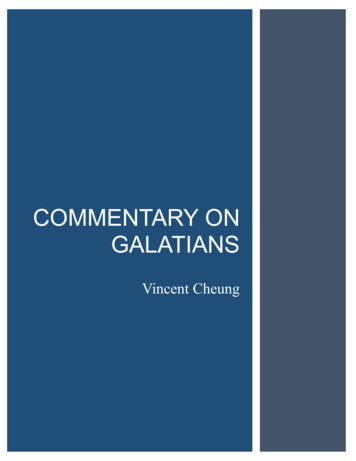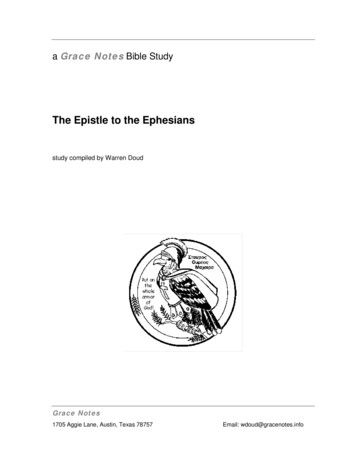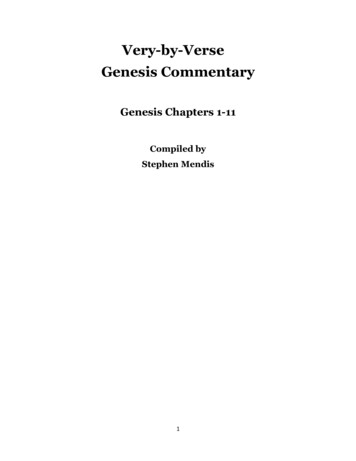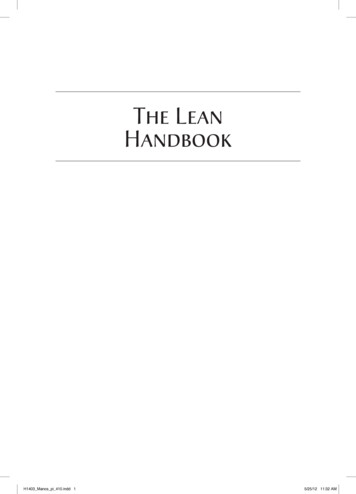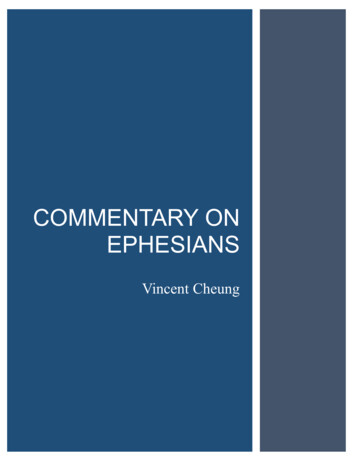
Transcription
COMMENTARY ONEPHESIANSVincent Cheung
Copyright 2014 by Vincent Cheunghttp://www.vincentcheung.comPrevious editions published in 2004 and 2013.All rights reserved. No part of this publication may be reproduced, stored, or transmittedwithout the prior permission of the author or publisher.Unless otherwise indicated, Scripture quotations are taken from the HOLY BIBLE, NEWINTERNATIONAL VERSION. Copyright 1973, 1978, 1984 by International BibleSociety. Used by permission of Zondervan Publishing House. All rights reserved.2
CONTENTS1. INTRODUCTION . 4EPHESIANS 1:1-2 . 42. PREDESTINATION . 8EPHESIANS 1:3-14 . 83. REGENERATION . 47EPHESIANS 1:15-23 . 47EPHESIANS 2:1-10 . 594. RECONCILIATION . 67EPHESIANS 2:11-22 . 67EPHESIANS 3:1-13 . 72EPHESIANS 3:14-21 . 755. SANCTIFICATION. 80EPHESIANS 4:1-16 . 80EPHESIANS 4:17-24 . 92EPHESIANS 4:25-5:2 . 97EPHESIANS 5:3-20 . 98EPHESIANS 5:21-6:9 . 101EPHESIANS 6:10-20 . 1086. CONCLUSION. 127EPHESIANS 6:21-24 . 1273
1. INTRODUCTIONEPHESIANS 1:1-2Paul, an apostle of Christ Jesus by the will of God,To the saints in Ephesus, the faithful in Christ Jesus:Grace and peace to you from God our Father and the Lord Jesus Christ.Following the convention of his day, Paul first identifies himself as the writer, and thenaddresses his readers and states his greeting. As usual, he fills this space with Christiancontent, so that even the greetings in his letters are full of theological richness, and thepower to teach and edify.Paul writes as "an apostle of Christ Jesus." He is sent with authority from Christ, who toldhis apostles that the Holy Spirit would instruct them after his resurrection and ascension,and that they would testify about him (John 15:26-16:16). So John could write, "We arefrom God, and whoever knows God listens to us; but whoever is not from God does notlisten to us. This is how we recognize the Spirit of truth and the spirit of falsehood" (1 John4:6).Whereas the first apostles were with Christ "from the beginning" (John 15:27), Paul wasnot with him. Rather, Christ has made Paul a special case, so that he appeared to him onthe way to Damascus, and converted him and called him to the apostle's ministry (Acts 9).As Paul writes, "Last of all he appeared to me also, as to one abnormally born" (1Corinthians 15:8). Later, Paul went to the apostles who were with Christ in the flesh, andset before them the gospel that he had been preaching among the Gentiles (Galatians 2:2),not to obtain their approval, but to confirm their unity. These apostles – including James,Peter, and John – agreed with Paul's message and recognized his ministry as from God,giving him "the right hand of fellowship" (Galatians 2:9).Christ sent the apostles to speak for him, and he said that those who would accept themalso accept him (John 13:20). The church is built on the apostolic doctrine as its foundation,with Christ as the cornerstone (Ephesians 2:20; also Acts 2:42), and so we must listen toPaul because we must listen to Christ. Therefore, Paul warns that those who disagree withhis gospel are not Christians at all (Galatians 1:6-12).Paul did not become an apostle by the will of men, and he did not become one by earningor seizing the office; rather, he was chosen to be an apostle "by the will of God." As Barclaysays:Paul never thought of himself as having chosen to do God's work.He always thought of God as having chosen him. Jesus said to hisdisciples: "You did not choose me, but I chose you" (John 15:16).4
Here precisely lies the wonder. It would not be so wonderful thatman should choose God; the wonder is that God should chooseman.1God's sovereign decree was the foundation of the authority of his ministry and his theology.To doubt or oppose what Paul wrote as an apostle is to doubt or oppose God – there is nodifference.That said, God was the one who produced the Bible, and Paul was a mere instrument bywhich God delivered his revelation. In fact, since God moved men to write exactly whathe wanted (2 Peter 3:16), he was the only actual author. A man could use a hundred pensto write a book, the pens varying in color, thickness, and so on. He could use variouswriting styles and literary forms, and write in several languages. Each section would thenexhibit many differences, but there would still be one author and one book. Indeed, menare more than pens, but God is more than a human author. The human author purchases thepens, and he has limited mental ability to produce variety, but God made the men that heused to write the Bible, and with his infinite intelligence he held them by his Spirit as hecaused them to write. Thus the instruments were secondary, but the central issue is that"All Scripture is God-breathed" (2 Timothy 3:16).Although we make the usually harmless generalization that the apostles and prophets wrotethe Bible, significant portions of the Bible were not written by them, or not known to bewritten by them. To address this, some people invent the principle that these documentswere nevertheless written by those who were closely associated with the apostles andprophets. However, they arbitrarily dictate this principle without warrant, and they alsoarbitrarily decide how closely associated with the apostles and prophets these other authorsneed to be. In addition, the relationships of these authors to the apostles, and the scribes tothe prophets, are often uncertain, and offer a weak foundation for something as weighty asdivine inspiration. The entire difficulty is self-inflicted due to the false assumption thatevery word in the Bible must be written or approved by apostles and prophets.However, once we point out that God is the author, even the only actual author, then itbecomes evident that the matter of human authorship is unable to undermine the inspirationof Scripture, because it has no decisive relevance in the first place. God can write on tabletsof stones, speak in a voice from heaven, enable a donkey to talk, make stones cry out, orcause a man to write his words. God is the one who speaks and writes. Although he oftenused the apostles and prophets, he could cause anything to happen through anyone hechooses. By his Spirit, he took hold of various men and caused them to write out his words.Then, by his providence, he secured these documents and compiled them into one finalvolume. Thus inspiration applies to every word in the Bible, not because every word waswritten by apostles and prophets, but because every word was written by God.Although Paul addressed the letter to "the saints in Ephesus," several indications within theletter suggest that it could have been intended for a broader audience. He had preached in1William Barclay, The Letters to the Galatians and Ephesians, Revised Edition; Westminster John KnoxPress, 1976; p. 77.5
Ephesus for three years (Acts 20:31), two of which were spent in daily discussions in thelecture hall of Tyrannus (Acts 19:10). The result was that "all the Jews and Greeks wholived in the province of Asia heard the word of the Lord" (Acts 19:10).2 But in our letter,Paul says that he has merely "heard about" the faith of his readers (Ephesians 1:15), andthat his readers must have "heard about" his ministry (3:2). Also, the letter lacks thepersonal references and greetings that are typical of his other letters. The implication is thatPaul was writing not only to those whom he knew well, but also to those whom he merely"heard about." Therefore, it seems that his intended audience included more than theEphesians.This is considered the least occasional of Paul's letters. It was not written to address specificsituations and heresies, and this is consistent with the view that it was probably a generalor circular letter. At the same time, Paul's expressions related to "the spiritual forces ofevil" (Ephesians 6:12) and his discussions about Christ's dominion over all the spiritual"powers" (1:18-2:2) remind us of the spiritual atmosphere of Ephesus, and some of thethings that he encountered there.3In fact, after several incidents in which the name of Jesus demonstrated its power (Acts19:13-17) and the Christian message triumphed over pagan magic and superstition (Acts19:18-20), "the word of the Lord spread widely and grew in power" (Acts 19:20) to suchan extent that it threatened the economic structure of Ephesus, which to a large extentdepended on pagan worship (Acts 19:23-27). Demetrius the silversmith said that Paul'spreaching had affected "large numbers of people here in Ephesus and in practically thewhole province of Asia" (Acts 19:26). Luke writes that "all the Jews and Greeks who livedin the province of Asia heard the word of the Lord" (Acts 19:10).So it is reasonable to assume that as Paul wrote this letter to the Ephesians, he also had inmind all the other Christians throughout the province of Asia, and that he sent it to Ephesus,the area's chief city, and from which he published the gospel to the whole region for threeyears, with the intention to address these other Christians as well. Therefore, it is likely thatour letter was meant to be read by the Christians in Ephesus and the surrounding areas.4 Inany case, because the letter is not situational, it is unnecessary to know the exactcircumstances of its origin and circulation, since these things do not determine theinterpretation of the letter.Paul calls his readers "the saints in Ephesus"5 and "the faithful in Christ Jesus."6 He isspeaking to Christians, those who have been consecrated to God through faith in JesusChrist. He would jubilantly glory over all the spiritual blessings that God has given to "us"2"Asia" is today's Turkey.Clinton E. Arnold, Power and Magic: The Concept of Power in Ephesians; Baker Books, 1992.4William Hendriksen, Exposition of Ephesians; Baker Books, 1967; p. 61.5For an explanation of the word "saints," see Vincent Cheung, Commentary on Philippians.6Or "the believers in Christ Jesus." Hendriksen argues that since the definite article is not repeated beforethe second word ("faithful"), the first and the second therefore form one unit, and that both of them shouldbe taken as nouns and not adjectives. Thus he translates, "to the saints and believers who are in Ephesus inChrist Jesus." Hendriksen, p. 70.36
and that "we" enjoy in Christ.7 By noting that the "we" and "us" are restricted to Christians,we exclude the possibility that non-Christians can enjoy these spiritual blessings.If a man has no faith in Jesus Christ, he is not a Christian. Perhaps he has a degree intheology, but if he denies the inspiration and authority of Scripture, he is doomed to helljust as much as an unrepentant prostitute or murderer. He may promote social welfare inthe name of Christianity, but if he disagrees with the doctrines of Christianity, he is farfrom the kingdom of God. If a person claims to have faith in Jesus Christ but says that nonChristian religions are true and good, he is an imposter, and he portrays Christ as a friendof demons.True faith in Christ is faith in him as he really is – Redeemer, Lord, and God – and not asyour slave or your pet, to be adored or dismissed as you please. True faith in Christ makesyou an enemy to the whole world, because it means that you despise their idols and values,and that you have become a light that exposes their foolishness and wickedness. If youdisagree with this, your allegiance to Christ is false, and there is no warrant for you to haveany spiritual assurance. As James writes, "You adulterous people, don't you know thatfriendship with the world is hatred toward God? Anyone who chooses to be a friend of theworld becomes an enemy of God" (James 4:4).Paul concludes the greeting with his usual benediction, that his readers would have "graceand peace." He combines the greetings of the Gentiles and the Jews, and fills the wordswith Christian meaning. The Gentiles wished one another "grace." To the Christian, thisrefers to the unmerited and undeserved blessings of God, and especially stresses God'ssovereign kindness and initiative in salvation. The Jews wished one another "peace," or theHebrew shalom. As with many other instances in the Bible, this "peace" does not refer toa subjective state, but an objective condition. Among other things, this refers to thereconciliation between God and his chosen ones, and also to the harmony among God'speople.Such grace and peace come "from God our Father and the Lord Jesus Christ." There is nograce and no peace apart from God, who authored our salvation, and Christ, who obtainedour salvation. The preposition "from" introduces the entire expression "God our Father andthe Lord Jesus Christ," suggesting that the two are on the same level. The Christ of theBible was God, who took up a human nature, and sacrificed himself for those whom Godhad chosen in eternity.7In 1:11-13, Paul distinguishes between "we" (the Jews) and "you" (the Gentiles) to make his point that thetwo are now united in Christ.7
2. PREDESTINATIONEPHESIANS 1:3-14Praise be to the God and Father of our Lord Jesus Christ, who has blessed us in theheavenly realms with every spiritual blessing in Christ.For he chose us in him before the creation of the world to be holy and blameless in hissight. In love he predestined us to be adopted as his sons through Jesus Christ, inaccordance with his pleasure and will – to the praise of his glorious grace, which hehas freely given us in the One he loves.In him we have redemption through his blood, the forgiveness of sins, in accordancewith the riches of God's grace that he lavished on us with all wisdom andunderstanding. And he made known to us the mystery of his will according to his goodpleasure, which he purposed in Christ, to be put into effect when the times will havereached their fulfillment – to bring all things in heaven and on earth together underone head, even Christ.In him we were also chosen, having been predestined according to the plan of himwho works out everything in conformity with the purpose of his will, in order that we,who were the first to hope in Christ, might be for the praise of his glory. And you alsowere included in Christ when you heard the word of truth, the gospel of yoursalvation. Having believed, you were marked in him with a seal, the promised HolySpirit, who is a deposit guaranteeing our inheritance until the redemption of thosewho are God's possession – to the praise of his glory.Although our English translations divide this passage into sentences and paragraphs, in theoriginal Greek it consists of one long sentence. And although the sentence is denselypacked with theological content, it is not written in the form of a precise formulation orordered argument, but in the form of a doxology.Some people think that theology is lifeless and useless, but our relationship with Godshould consist of doxology. But what is the content of our doxology? And where does itcome from? If worship and praise are so important, then it is also important to know whomwe are worshiping and for what we offer praise. As we answer these questions, we aredoing theology.It is commonly asserted that right theology does not necessarily lead to right worship, andthat right doctrine does not necessarily lead to right living. This is misleading – it is trueonly in the sense that a person may learn the right theology without really agreeing with it.If there is no right worship and right living, then either the theology is not right after all, or8
there is no true assent to what God has revealed. This true assent occurs by the Holy Spiritthrough his work of regeneration and illumination.Paul's doxology is filled with theology. He is praising God about certain things, and itwould be impossible to share his reverent awe and enthusiasm without also knowing aboutthese things. The less theology you know, the more shallow your worship will be, and anempty doxology is no doxology at all. Theology is the necessary foundation of doxology,and doxology is the proper context for theology.Christian faith and practice are coherent and harmonious, so that you should not have tothink one way when you are praying and another way when you are studying. There is noreason for a devotional book to be more practical or mystical than theological. Unless thereis something wrong with the material or with you, a systematic theology or biblicalcommentary should produce thoughts of praise and thanksgiving such that they erupt indoxology. This is what happens to Paul as he reflects on God's grand plan for history andhis goodness toward the chosen ones.The passage consists of one long sentence containing a number of clauses and phraseswhose relationship with one another is not always easy to determine, and each thoughtseems to crowd in on the previous one and blend into the next. For this reason, somecommentators have concluded that it is impossible to clearly dissect and analyze.Nevertheless, there are indications of deliberate structure and design. "Bless" is used threetimes in verse 3,1 followed by a seemingly Trinitarian outline, describing the roles of theFather, the Son, and the Spirit in the plan of God and the work of redemption. In theologicalterms, it refers to election, redemption, and application.2 Throughout, Paul repeatedly statesthe cause ("his will") and the goal ("his glory") of God's predetermined plan, as well as themeans ("in Christ") by which God would accomplish it. The passage also anticipates someof the themes that Paul will develop in the letter.ELECTIONPaul begins with the doctrine of predestination. In fact, much of what follows in the letteris an exposition of what God has predetermined to perform in history.In eternity, God had conceived and chosen an unchangeable number of specific individualsfor salvation, and had decided that he would adopt them to be his sons through Jesus Christ.According to his foreordained plan, all would fall into sin in Adam, including the elect,whom he had already chosen. Then, out of this mass of sinful humanity, he would call anddraw out his chosen ones, removing them from the kingdom of darkness and placing theminto the kingdom of his Son (Colossians 1:13).1"Blessed be the God and Father of our Lord Jesus Christ, who has blessed us with every spiritual blessingin the heavenly places in Christ" (NASB).2For the third item, Hendriksen has "certification" instead. (Ephesians, p. 71; see v. 13-14). This is correct,but I have chosen a term that includes additional things, such as faith (v. 13).9
His selection of each individual was not based on foreseen faith or works, but was madeapart from the person's decision or merit. This is part of what Paul has in mind when hewrites that God chose his people "before the creation of the world." In another place, whenPaul refers to Jacob and Esau in the context of predestination, he writes, "Yet, before thetwins were born or had done anything good or bad she was told, 'The older will serve theyounger'" (Romans 9:11-12).The objection may be that although God did not base his choice on anything that they hadalready done, perhaps he based it on something that he knew they would do. However,Paul says that God announced his decision before the twins were born "in order that God'spurpose in election might stand: not by works but by him who calls" (v. 11-12). When hedenies that election was based on something that the twins had already done, he also deniesthe possibility that it was based on something that they would do. This is because he deniesthat election was based on anything in them at all, but that it was based on "God's purpose"and on "him who calls."Paul assumes the same principle in Ephesians. God chose certain individuals not becauseof any foreseen faith or works in them, and not because of their decisions or merits, butelection to salvation is based solely on his will (1:5), his pleasure (v. 5), his grace (v. 6-7),his plan (v. 11), and his purpose (v. 11). God's choice of individuals was done apart fromanything foreseen in the individuals themselves. As Calvin writes:By this he means that God did not seek a cause [outside] of Himself,but predestinated us because such was His will .In adopting us,therefore, the Lord does not look at what we are, and is notreconciled to us by any personal worth. His single motive is theeternal good pleasure, by which He predestinated us .By this hetells us that God embraces us in His love and favour freely and noton a wage basis, just as, when we were not yet born, and when Hewas prompted by nothing but Himself, He chose us.3On the negative side, Paul makes a broad denial that election is based on anything in theindividual. On the positive side, he insists that election is based on God's will, grace,pleasure, and purpose. Therefore, theologians who are faithful to biblical teaching refer toelection as "unconditional."Then, the objection is that perhaps Paul is speaking of a collective election, or that perhapsthe object of election is Christ instead of the individuals. In other words, perhaps the onlychosen one is Christ himself, and God had determined that whoever would freely chooseto be in Christ by faith would be included in the elect group. However, the passage makesno hint toward this direction, but explicitly contradicts it. Over and over again, Paul usesexpressions like, "he chose us," "he predestined us," and "he lavished on us" – on "us," notChrist.3John Calvin, The Epistles of Paul the Apostle to the Galatians, Ephesians, Philippians and Colossians;Oliver & Boyd/Eerdmans, 1965; p. 127.10
The fact that God chose us "in him" does not suggest that we are the ones who placeourselves "in him." We as individuals never chose to be in Adam, but he was the federalhead of humanity, and all fell into sin and death in Adam (1 Corinthians 15:22). Likewise,for the elect to be "in Christ" means only that Christ is the federal head of the elect. It doesnot mean that each individual could of himself choose to be in Christ and become one ofthe elect, and it does not mean that Christ himself was the object of election for salvation.Moreover, Paul writes in 1 Corinthians 1:27-30, "But God chose so that no one may boastbefore him. It is because of him that you are in Christ Jesus, who has become for us wisdomfrom God – that is, our righteousness, holiness and redemption." He says that God was theone who chose us and placed us in Christ. This contradicts the suggestion that God choseChrist as the elect and then we place ourselves in Christ to become the elect. God's electionfor salvation refers to a selection of individuals – not of Christ, and not of a group.It is unlikely that expressions such as "in Christ," "in him," and "in whom" can be used tosupport collective election in the first place. This is because they refer to Christ as the agentby which God acts, or to Christ as the head of the chosen ones, and not to Christ as acontainer so that people can choose to drop into him. Thus when Paul says that God "choseus in him," he means that God "predestined us to be adopted as his sons through JesusChrist."4When it is asserted as a denial of individual election, collective or corporate election is asilly fantasy invented to overturn biblical doctrine.5 In fact, the very nature of God makesthe doctrine impossible, because it is inconsistent with divine omniscience. The Bibleteaches divine omniscience, that God knows all things; therefore, every Christian mustaffirm divine omniscience, or he is not a true Christian. Once divine omniscience isassumed, then for one to affirm God's sovereignty over groups of people obligates him toalso affirm God's sovereignty over all the individuals in these groups. Since an omniscientbeing knows all things, he would not think of a group and not think of the individuals thatmake up the group.For example, when I use the word "trees" without restriction, as in "these trees," I am usingit as an universal, as in "all trees." However, I do not know all trees, I have made none ofthem, I have determined none of their properties, and I do not exhaustively know even one4Referring to the expression "in Christ," Peter O'Brien writes, "Often its use is instrumental, signifying'through Christ's agency'" (The Letter to the Ephesians, The Pillar New Testament Commentary; Wm. B,Eerdmans Publishing Co., 1999; p. 97). He then makes several ambiguous statements about how itdesignates "Christ as the 'sphere' in which the divine decisions are made and put into effect" (98), but hehas in mind "The idea of the incorporation of many into a representative head" (98). In other words, "inChrist" refers to Christ as the agent by which God acts, or to Christ as the head of the elect. Thisunderstanding of "in Christ" prevents distortions of the doctrine of predestination, and also corrects anumber of false teachings based on the expression. As long as it remains ambiguous, people will remainsusceptible to strange interpretations. It refers to Christ's agency and representation, and not being "inside"of Christ in a mystical or physical sense. In fact, en in the Greek can be translated "in," "by," or "with," andsometimes "the causal sense of en is more intelligible than the local" (Gordon H. Clark, Ephesians; TheTrinity Foundation, 1985; p. 16). So "in Christ" often means nothing other than "by Christ" or "throughChrist."5See also O'Brien, p. 99.11
tree. When I say "trees," the knowledge that corresponds to the word does not include alltrees, or even one tree, although I intend to refer to all trees. So do I know what I am saying?On the basis of empiricism, there would be no warrant to claim that I know. Rather, I referto the idea of trees as it exists in the mind of God.On the other hand, when God uses the word "trees," he says it as one who has made all ofthem and who knows all of them. His knowledge of all particular trees corresponds to hisconcept of the universal "trees." Therefore, when God says that all trees are a certain way,he has in mind every tree, that every tree is a certain way, and not trees in the abstractwithout the actual content of all trees. Since God is omniscient, to him "trees" must meanthe sum of all individual trees, and not trees in the abstract.If you have two children, named Tom and Mary, then every time you say "my children,"you are in fact referring to the individuals named Tom and Mary. By the general term "mychildren," you intend to include and express the particular items "Tom" and "Mary." Youwould not say "my children" and not mean "Tom and Mary." The words, "my children,"mean the same thing as "Tom and Mary." Suppose you are omniscient, but you do not yethave children. In this case, "my children" would still mean "Tom and Mary," since youwould know that you will have these children in the future.If one possesses omniscience, then by definition he never uses a designation of a groupwithout conscious knowledge of all the members of the group. The universal term for thegroup always represents the sum of all the individuals in the group. One who lacksomniscience uses the universal term for a group without knowledge of all the individualsin the group, but one who possesses omniscience uses the universal term with a consciousknowledge of all the individuals in the group. This is a necessary implication ofomniscience.Thus when God thinks of a nation, he also thinks of all the individuals that make up thenation, since this is what a nation means – it is the sum o
That said, God was the one who produced the Bible, and Paul was a mere instrument by which God delivered his revelation. In fact, since God moved men to write exactly what he wanted (2 Peter 3:16), he was the only actual author. A man could use a hundred pens to write a book, the pens var
